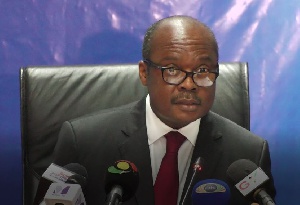 Dr. Ernest Addison, BoG Governor
Dr. Ernest Addison, BoG Governor
The Economist Intelligence Unit (EIU) has said it sees no more room for further policy rate easing, predicting that the central bank is likely to tighten its policy rate come the first-half of next year.
In its December 2018 Country Report, the research and business advisory firm stated that: “After six interest-rate cuts between the start of 2017 and May 2018, the BoG’s ability to ease monetary policy further has diminished.
“Inflation has increased over the course of 2018 toward the upper-end of the official target of 6-10%, following interest rate rises in the United States causing sustained pressure on emerging-market currencies, including the cedi.”’
The Monetary Policy Committee of the Bank of Ghana at its recent meeting in November maintained the policy rate at 17 percent – the third consecutive time since May 2018.
“The next move in interest rates is likely to be in an upward direction, particularly if the downward pressure on the cedi intensifies into 2019, as we expect, owing to ongoing strength in the US dollar.
“Business groups continue to call for cheaper credit. We believe the BoG may raise rates further in the first-half of 2019 in a bid to dampen inflationary pressures, but the impact will be limited owing to external pressures.
“As inflation then moderates in 2020-21, and domestic demand weakens, the door will open for a resumption of monetary easing. This will be followed by renewed tightening in 2022-23, as domestic demand once again strengthens,” the EIU report said.
According to the EIU’s forecast, revenue collection will continue to remain government’s preoccupation in the coming year; while acknowledging that steps to strengthen the Ghana Revenue Authority to ensure broader enforcement of Tax Identification Number (TIN) measures, and build the capacity of local governments to collect taxes, will yield some results.
“However, with expenditure rising sharply—driven largely by increases in the public sector wage bill, interest payments and capital expenditure—we estimate that the fiscal deficit will have widened to 5.3% of GDP in 2018. With the IMF urging government to tackle revenue gaps and reduce tax exemptions, we expect a more concerted move toward fiscal consolidation in 2019.
“Nonetheless, the authorities will remain reticent to lower spending on salaries, given the risk of public resentment. Further resources will continue to be devoted to the ongoing strengthening of the banking sector and the government’s industrialisation strategy. As a result, we expect only a modest overall narrowing of the fiscal deficit to 4.4% of GDP in 2019,” the country report said.
Nevertheless, the report also predicted that there will be a faster spending growth in the election year of 2020, as well as tax-cuts – with the deficit increasing to 5% of GDP as a result (although this fiscal slippage will be much less than it was in the election years of 2016 or 2012).
“We then forecast a return to consolidation, leading to a deficit of 3.3% of GDP in 2023. The rate of decline in the fiscal deficit at a time of robust economic growth will be enough to make a modest dent in the public debt stock, which will edge down from an estimated 54% of GDP at end-2018 to about 47% of GDP at end-2023.
“However, longer-term debt sustainability will still require ongoing fiscal responsibility and continued robust levels of economic growth,” the EIU advised.
BoG hopeful Q1 2019 interest rates cut
The central bank, on the other hand, has indicated that it could cut interest rates early next year if inflation continues to drift lower.
Dr. Ernest Addison told Reuters recently that: “I can easily see the policy rate going further down”.
Asked how soon the 17 per cent rate could be cut, he replied: “Our next meeting is in January and after that we have another meeting in March, so in between now and March”.
He also said the central bank will look to push local money market traders to use electronic trading platforms more, rather than do deals over the phone. He said it is a measure that could help slow the recent falls in the country’s currency value.